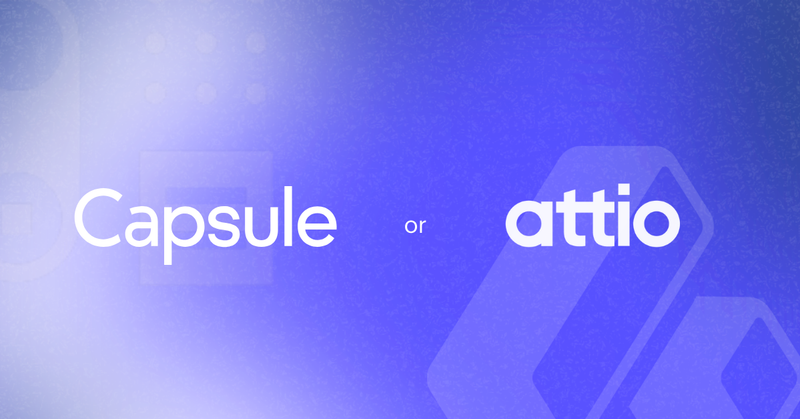Whether you’re a small business just starting out or a larger team with a large and varied customer base, finding the right customer relationship management (CRM) tool helps improve how you manage and engage with your customers.
CRMs help centralize all of your customer data, from contact details to communication history, empowering your customer-facing staff to nurture customer relationships and grow your business.
However, with hundreds of CRMs to choose from, finding the right one for your business can be tricky.
Capsule and Attio are both popular CRM options, each offering different features for different business needs. In this guide, we’ll compare Capsule and Attio, looking at their strengths and weaknesses, so you can determine which CRM best fits your organization’s requirements.

Capsule and Attio plans compared
For small businesses or startups, affordable or free CRM plans provide a low-risk way to try new tools and see how they complement your sales activities.
Both Capsule and Attio offer free plans so you can explore which CRM works best for your business. However, both take a different approach to how they go about presenting their features, which can make it difficult to compare what you’re getting.
For example, Capsule uses contacts and custom fields to help you organize your leads and capture unique information. Attio, on the other hand, uses a combination of “Objects” (People, Companies, Deals, etc.) and “Attributes” to track companies and deals as they progress through the pipeline, similar to the way Notion uses different modules to create custom workspaces.
| Capsule’s Free plan | Attio’s Free plan |
|---|---|
Up to 2 users | Up to 3 users |
Up to 250 contacts | Unlimited contacts |
5 custom fields | Up to 3 non-custom objects |
1 customizable pipeline | Up to 3 reports |
Gmail and Outlook integrations | Email and calendar sync |
Unlimited “Tracks” for repeating tasks | Shared email subject lines |
Unlimited lists | Integration blocks (100 workflow credits per month) |
Social enrichment | Essential company and people enrichment |
Capsule’s free plan includes the essential tools needed to manage customer relationships effectively, making it ideal for small businesses testing the waters. Users get access to contact management and pipeline customization to start managing customer relationships more effectively immediately.
Attio CRM’s Free Plan offers slightly more flexibility in terms of user count and contact limits, making it suitable for slightly larger teams or those anticipating quick growth. However, getting familiar with Attio’s unique setup may take more time.
As your business grows, you’ll likely need more advanced features to manage your expanding customer base and workflows. Both Capsule and Attio offer starter plans that build upon their free offerings with enhanced capabilities.
| Capsule Starter plan | Attio Plus plan |
|---|---|
$17 per user/month | $32 per user/month |
30,000 contacts | Improved company and people enrichment |
50 custom fields | Up to 5 non-custom objects |
Sales pipeline dashboard | Up to 20 reports |
Gmail/Outlook integration | Shared email subjects, bodies, and attachments |
Project boards | 1,000 workflow credits per month |
Capsule’s Starter plan comes with significant upgrades, including increased contact limits and access to premium add-ons. These enhancements make it easier for teams to share their mailbox for improved collaboration and gain more insights through reporting.
The Attio Plus plan provides enhanced data enrichment, email capabilities, and contact analysis. You can also create private lists and dashboards with improved privacy settings.
For larger businesses, both platforms offer advanced tiers with added features and functionality. Capsule’s Ultimate plan offers a top-of-the-range solution for $73 per user per month. You get personalized support with access to a dedicated account manager, ongoing priority assistance, and custom training.
You’ll also automatically get all the features from the other plans, such as workflow automation, advanced reporting, multiple project boards, multiple sales pipelines, and contact enrichment.
Attio’s Pro plan provides advanced data enrichment, access permissions, and reporting, along with complete email sharing and sending features. The top-tier Enterprise plan adds more advanced admin tools with permission access and comes to $128 per user per month.
The Attio Enterprise plan is built for large organizations working across multiple sites, but Capsule’s Ultimate Plan stands out with its extensive personalized support and training, ensuring that your team can maximize the platform’s potential and drive sustained growth.

What features and functionality do Capsule and Attio offer?
Capsule focuses on simplicity while offering powerful tools that adapt to your business processes. It comes with all the core features you’d need in a CRM, including customizable fields, pipelines, and workflows designed to streamline sales and customer management.
For example, the Tracks feature helps teams create standardized task lists for regular processes, providing valuable consistency and saving time. When paired with workflow automation, you can trigger Tracks to start automatically when your chosen criteria are met, keeping tasks on track without you having to micromanage every last detail.
Capsule also provides other useful features like contact management, project management, reporting, and email integration, making it a well-rounded CRM for small to medium-sized businesses aiming to optimize their sales and workflows.
Attio focuses on data-driven relationship management with custom objects that allow businesses to organize companies, contacts, and deals in a way that fits their unique workflows.
Attio also offers automatic data enrichment at all levels, pulling relevant customer details and communication histories directly into the CRM, reducing manual data entry, and keeping your records up-to-date.
Which CRM connects best with your existing software?
A CRM is a powerful tool, but it becomes even more useful when sharing information with your other apps. Integrations play a vital role in extending the functionality of your CRM, enabling you to seamlessly connect your software with your team’s existing tech stack.
Capsule’s App Marketplace is a collection of useful integrations designed to help small to medium-sized businesses connect with the most popular tools in various categories. All the integrations are easy to use, meaning your team can collaborate more effectively without having to spend so long on manual data entry.
Popular integrations include:
- Accounting software like Xero and QuickBooks
- Email and productivity apps like Microsoft 365 and Google Workspace
- Marketing tools like Mailchimp and Transpond
On the rare occasion that there isn’t already a native integration, Zapier connects Capsule with over 2,000 apps, or you can create your connection with Capsule’s API.
Attio is a little more limited when it comes to integrations. You can set up automations with apps like Slack, Typeform, and MixMax. However, in many cases, you’ll need to rely on Zapier or the API to connect your tools. As a result, Capsule’s broader integration ecosystem makes it the better choice for businesses needing a connected, all-in-one CRM solution.

Which CRM is best for ease of use?
While most people (understandably) focus on features, it’s important not to overlook how easy to use the CRM is. A user-friendly CRM means your team is going to be able to get up and running sooner and will be able to get the most out of the software.
Capsule is designed to be simple, with a clean, intuitive interface that keeps things straightforward. Every aspect is organized logically, helping teams quickly navigate contact records, sales pipelines, and tasks. Features work “out of the box,” reducing the need for extensive onboarding or customization so even the most tech-averse business can get started easily.
Attio CRM offers a sleek, modern interface focused on streamlined data management. Its workspace-driven design provides dynamic views of contacts and customer interactions.
However, setting up custom objects and tailoring workspaces might require a deeper understanding of how the platform structures data, which could increase the learning curve for some teams.
While both platforms are user-friendly, Capsule’s simplicity and minimal setup make it more approachable for smaller teams or businesses new to CRMs. At the same time, Attio’s modern but more complex interface is better suited for data-driven teams that are comfortable with customization.
Which CRM is best for pricing and affordability?
Pricing plays a significant role in choosing the right CRM, especially for businesses managing tight budgets or planning long-term growth.
Capsule offers straightforward pricing with transparent monthly rates and clear feature breakdowns. Its paid plans start at $17 per user per month, scaling up to $73 per user per month for the Ultimate plan. The free plan offers enough features to get small teams started, making Capsule a cost-effective solution for growing businesses.
Capsule’s predictable pricing ensures there are no hidden fees or unexpected charges. Its entry-level plan supports core CRM functionalities, while its higher-tier plans unlock advanced features like workflow automation and priority customer support.
Attio also offers plenty of powerful features, along with a free plan to help you get started. However, the paid plans come in at a higher price point, starting at $31 per user per month on the cheapest plan and going up to $128 per user per month on the Enterprise plan.
While Attio has many useful features, Capsule is the more affordable option for small to medium-sized businesses, offering the functionality you need at affordable prices.

Which CRM offers more customization and flexibility?
Every business is different, so why would you want a CRM that forces you to work the same as everyone else? Capsule and Attio both allow you to customize your CRM to your business’s unique needs and processes.
Capsule excels at customization with its flexible pipelines, custom fields, and task automation features. You can adjust how contacts, deals, and tasks are organized, creating a CRM that matches different workflows.
Key customization features include:
- Custom fields to add unique data points to contacts, deals, or projects
- Custom pipelines to tailor sales pipelines to fit your process stages
- Tags and filters to segment your contacts for more personalized outreach
These features make Capsule adaptable without overwhelming users, making it ideal for small to medium-sized businesses.
Attio CRM takes a different approach, emphasizing data-driven customization through custom objects. Custom objects allow you to define entirely new data models beyond standard CRM fields, making it useful for companies with completely unique use cases. However, that type of customization can lead to a steeper learning curve.
Which CRM is best for customer support and security?
Your customers are one of your most valuable assets, so any CRM you use should help protect them and their data. Reliable customer support and robust security features mean you can do your work and handle sensitive customer data with confidence.
Capsule CRM is well-known for its responsive customer service. All customers, regardless of their plan, can access email-based support and an extensive online knowledge base. For businesses on the Ultimate plan, Capsule offers priority support, a dedicated account manager, and personalized training to get the most out of the CRM.
On the security front, Capsule delivers enterprise-grade protection with end-to-end encryption, secure data storage, regular backups, and a proven track record of 99.99% uptime.
Attio CRM also prioritizes customer support with multiple support tiers. Both free and paid plan users get access to chat and email-based support along with product documentation. Pro and Enterprise users also get access to priority support.
Attio’s security features include data encryption, compliance with key industry standards, and access controls on the Plus plan and above to ensure sensitive customer data is well protected.
Which CRM is better for my organization?

Choosing between Capsule and Attio depends on your business’s goals, workflows, and priorities. Both platforms excel in different areas, making them suitable for different types of businesses.
Capsule is ideal for small to medium-sized businesses that value simplicity, customization, and affordability. Its intuitive design, customizable fields, and affordable pricing make it easy to organize customer data, manage sales pipelines, and streamline your daily tasks.
Attio stands out for businesses with advanced data management and customization. The custom objects and automatic contact enrichment make it a strong choice for organizations requiring in-depth customization.
However, Capsule’s approachable design and accessible pricing make it a flexible, user-friendly CRM for teams seeking powerful features without the complexity or high costs. It’s no surprise then that users on G2 felt that Capsule meets the needs of their business better than Attio.
Try any Capsule plan free for 14 days or sign up to our free plan to get started with a simple yet powerful CRM.




